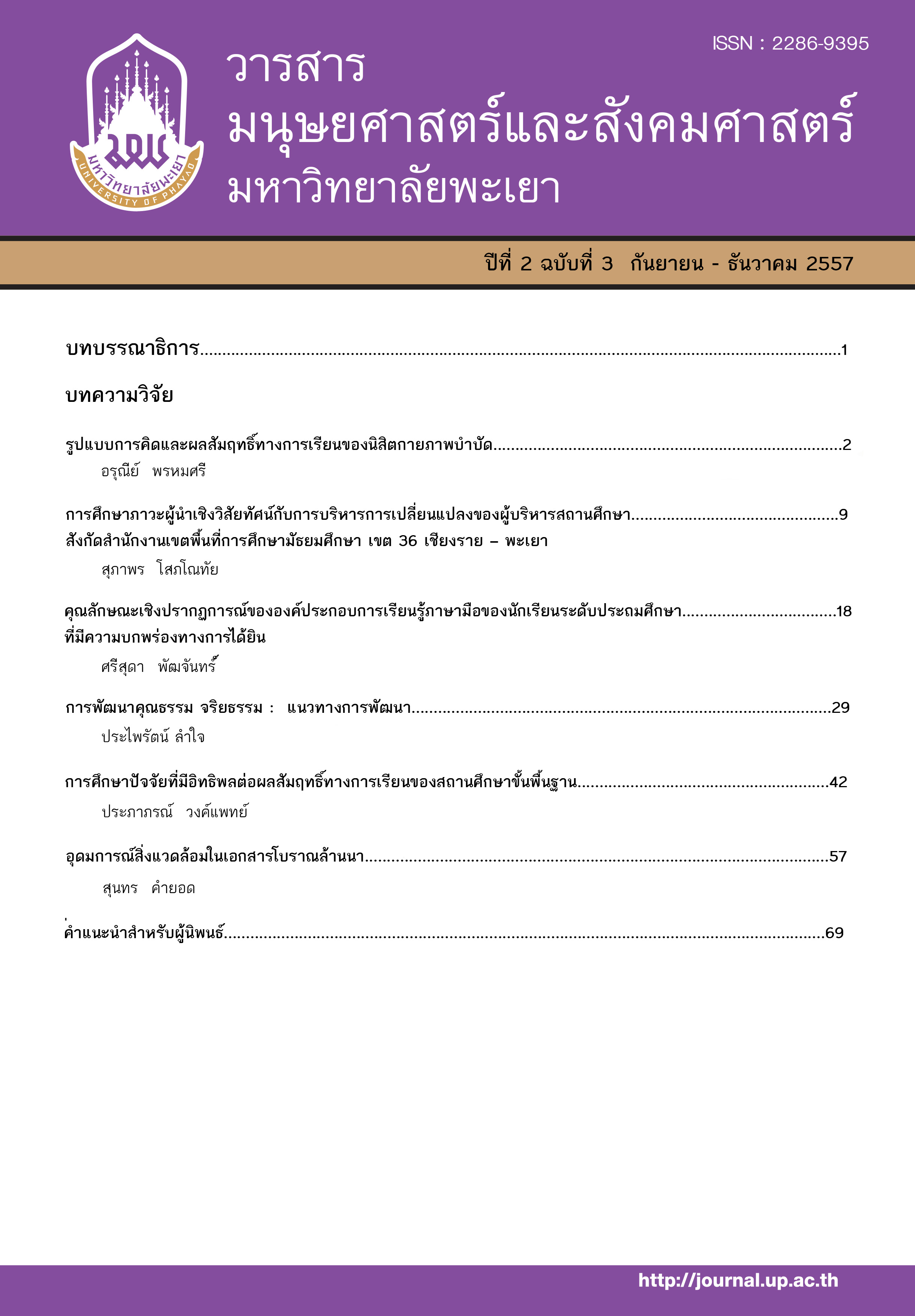Cognitive Style and Academic Achievement of Physical Therapy Students, University of Phayao
Keywords:
Cognitive style, Academic achievement, Physical therapy studentAbstract
Cognitive style is a term used in cognitive psychology to describe the way individuals think, perceive and remember information. Cognitive style differs from cognitive ability or level, and a cognitive style test is not an intelligence test. The purpose of this study was to classify the type of cognitive styles of undergraduate physical therapy students, University of Phayao, who studied in the first semester, 2013. The 147 physical therapy students were asked to answer the questions of the cognitive style assessment. The information about cognitive styles was analyzed and classified as three types, including Dependence, Independence, and Developed-participation. The results shown that the cognitive styles of the physical therapy students were Developed-participation type (72.90%) and Independence type (27.10%), and there was no student in Dependence type. Furthermore, the cognitive styles of physical therapy student were found to be not correlated with the academic achievement, but a significant negative relationship was represented between the academic achievement and of physical therapy students’ age.
References
สุรางค์ โค้วตระกูล. (2556). จิตวิทยาการศึกษา. พิมพ์ครั้งที่ 11. กรุงเทพมหานคร: สำนักพิมพ์แห่งจุฬาลงกรณ์มหาวิทยาลัย.
Evans C, Cools E, Charlesworth ZM. (2010). Learning in higher education - how cognitive and learning styles matter. Teaching in Higher Education;15(4):467-78.
จิราภา เต็งไตรรัตน์, นพมาศ อุ้งพระ, รัจรี นพเกตุ, วารุณี ภูวสรกุล, ศรีเรือน แก้วกังวาล, ศันสนีย์ ตันติวิท และคณะ. (2554). วิทยาทั่วไป. พิมพ์ครั้งที่ 7. กรุงเทพมหานคร : สำนักพิมพ์มหาวิทยาลัยธรรมศาสตร์.
ทิพยวรรณ กิตติพร. (2542). จิตวิทยาทั่วไป (General psychology). พิษณุโลก: ภาควิชาสังคมศาสตร์ คณะมนุษยศาสตร์และสังคมศาสตร์ มหาวิทยาลัยนเรศวร.
Witkin HA, Moore CA, Goodenough DR, Cox PW. (1977). Field-dependent and Field-independent cognitive styles and their educational implications. Review of Education Research;47(2):1-64.
เอมอร กฤษณะรังสรรค์. (2545). รายงานวิจัย เรื่อง รูปแบบการคิดของนักศึกษา ชั้นปีที่ 1 สถาบันราชภัฏสวนสุนันทา. กรุงเทพมหานคร: The East-West Psychological Science Research Center.
พระราชบัญญัติ วิชาชีพกายภาพบำบัด พ.ศ. 2547: ราชกิจจานุเบกษา; 22 ตุลาคม 2547.
คณะสหเวชศาสตร์ มหาวิทยาลัยพะเยา. (2555). หลักสูตรกายภาพบำบัดบัณฑิต หลักสูตรใหม่ พ.ศ. 2555. พะเยา: มหาวิทยาลัยพะเยา.
Cools E, van den Broeck H. (2007). Development and Validation of the Cognitive Style Indicator. Journal of Psychology;141(4):359-87.
สุธีร์ อินต๊ะประเสริฐ, เบญจลักษณ์ มณีทอน, ณรงค์ มณีทอน. (2546). ความสัมพันธ์ระหว่างความฉลาดทางอารมณ์และระดับความเครียดของนักศึกษาแพทย์ชั้นปีที่ 1 คณะแพทยศาสตร์มหาวิทยาลัยเชียงใหม่ วารสารสมาคมจิตแพทย์แห่งประเทศไทย; 48(4):231-8.
ศิริวรรณา สุขสว่างผล. (2541). ผลของวิธีเสนอให้เรียนที่มีผลต่อผลสัมฤทธิ์ทางการเรียนและความคงทนของการเรียนรู้ของนักศึกษาพยาบาลที่มีรูปแบบการคิดต่างกัน [วิทยานิพนธ์]. สงขลา: มหาวิทยาลัยสงขลานครินทร์.
กุลนิดา เต็มชวาลา, สุวรรณี พุทธิศรี. (2555). ความสัมพันธ์ระหว่างระดับความฉลาดทางอารมณ์และผลสัมฤทธิ์ทางการเรียนระดับมัธยมปลาย (คะแนน O-NET และคะแนนกสพท.) ของนักศึกษาแพทย์ชั้นปีที่ 1 ของโรงเรียนแพทย์แห่งหนึ่งในกรุงเทพมหานคร. วารสารสมาคมจิตแพทย์แห่งประเทศไทย;57(3):295-304.
Downloads
Published
How to Cite
Issue
Section
License
ผู้นิพนธ์ต้องรับผิดชอบข้อความในบทนิพนธ์ของตน มหาวิทยาลัยพะเยาไม่จำเป็นต้องเห็นด้วยกับบทความที่ตีพิมพ์เสมอไป ผู้สนใจสามารถคัดลอก และนำไปใช้ได้ แต่จะต้องขออนุมัติเจ้าของ และได้รับการอนุมัติเป็นลายลักษณ์อักษรก่อน พร้อมกับมีการอ้างอิงและกล่าวคำขอบคุณให้ถูกต้องด้วย
The authors are themselves responsible for their contents. Signed articles may not always reflect the opinion of University of Phayao. The articles can be reproduced and reprinted, provided that permission is given by the authors and acknowledgement must be given.








